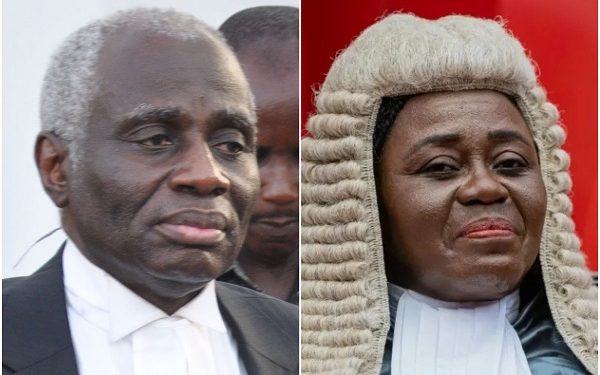Renowned Ghanaian lawyer and statesman, Tsatsu Tsikata, has reacted to the Supreme Court of Ghana’s recent ruling on an application by Speaker of Parliament, Alban Bagbin, which challenged the court’s order directing him to halt his declaration of four parliamentary seats as vacant.
In an interview with JoyNews on November 4, 2024, Tsatsu Tsikata expressed serious concerns over the justification the court provided for dismissing the Speaker’s application.
The legal luminary was particularly troubled by the court’s assertion that the responsibility to address matters concerning parliamentary seat vacancies lies solely with the High Court, which he argued contradicts Article 99 of Ghana’s 1992 Constitution.
Tsikata noted that in previous cases where the issue of parliamentary seat vacancies had been raised, the court had ruled that such cases should indeed be referred to the High Court, in line with Article 99 of the Constitution.
“Considering a matter regarding the PNC and in which the PNC had a critical interest. And that was not the issue before the Court. This court was dealing with a matter which had been brought by the then Majority Leader in Parliament in order to get the Court to reverse something that the Speaker had done. So, those analogies were completely irrelevant,” he explained.
“But more substantially, and I think these are some of the worrying signals. When you look at the ruling that the Court gave, certain obvious and critical factors were simply left out. You quoted the passage in which the Chief Justice talked about Article 99 of the Constitution, which gives the High Court powers in respect of the invalidation of a parliamentary election or the determination of the vacancy of the seat of an elected member of Parliament,” he added.
Tsikata elaborated that Article 99 has been interpreted by the Supreme Court in previous decisions to mean that the High Court holds exclusive jurisdiction over such matters, citing several cases, including the Santrokofi, Akpafu, Lipke, and Lolobi (SALL) case.
In the SALL case, Tsikata noted, Chief Justice Justice Gertrude Torkornoo herself had authored a ruling affirming that cases related to parliamentary vacancies are under the jurisdiction of the High Court. He added that even the justification based on human rights violations, which the court cited in dismissing the Speaker’s application, still falls within the High Court’s jurisdiction.
“The Supreme Court determined that the High Court had exclusive jurisdiction. And the Chief Justice at that time, a justice of the Supreme Court, was a part of that panel. In fact, when the matter went on review, she wrote the decision of the Supreme Court and very clearly laid out in elaborate language, Article 99 gives the High Court exclusive jurisdiction,” he stated.
Tsikata further argued that the Supreme Court should have explained its reasoning if it intended to deviate from its earlier rulings on the issue of parliamentary seat vacancies in this particular case involving the Speaker.
“So if the Court constituted recently wanted to depart from those judicial precedents, Article 129(3) of the Constitution makes it quite clear that they have got to give us reasons why those decisions that they have given previously are to be departed from,” he concluded.
About the Court’s Ruling:
On 30 October 2024, Ghana’s Supreme Court reaffirmed its directive for Speaker Alban Bagbin to halt his declaration of four parliamentary seats as vacant.
A five-member panel led by Chief Justice Torkornoo dismissed Bagbin’s application, reasoning that his declaration would irreparably harm the affected MPs and the tens of thousands of constituents they represent.
This decision has sparked public criticism, with some pointing to the court’s handling of the Assin North seat, where the MP was barred from serving for months, and the case of the people of Santrokofi, Akpafu, Lipke, and Lolobi (SALL), who remain unrepresented in Ghana’s 8th Parliament.
Source: GhanaWeb











